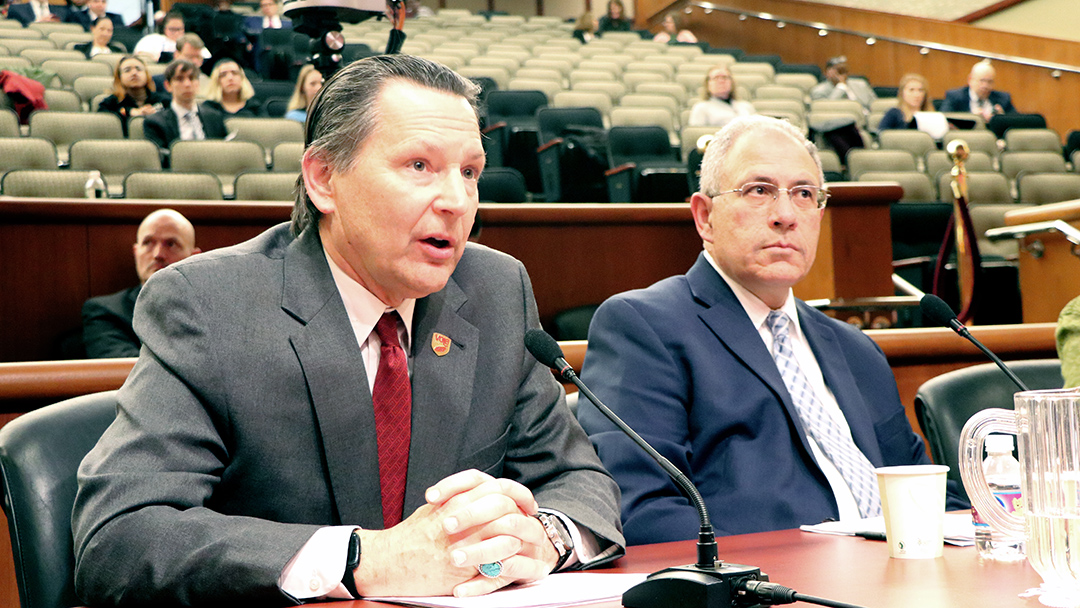February 4, 2020

CLICK HERE to read UUP's 2020-21 Executive Budget testimony
CLICK HERE to read UUP's media release about President Kowal's Executive Budget testimony
The financial problems plaguing SUNY’s campuses will continue—and worsen—without a real investment in the University by the state, UUP President Fred Kowal said at a Feb. 4 public hearing before the Legislature’s joint fiscal committees in Albany.
“I’m having real difficulty seeing an optimistic future for SUNY,” Kowal told legislators, who also heard testimony from SUNY, CUNY, the SUNY Student Assembly and the CUNY University Senate. “Campuses are suffering. There is not enough money to cover necessary costs.”
Several legislators, including Sen. John Liu (D-Flushing), agreed.
“The issue is that we’re not investing enough money in this state for higher education,” Liu said in comments to SUNY Chancellor Kristina Johnson earlier in the hearing. “It’s clear we need more money for higher education, both SUNY and CUNY. We have a problem, Chancellor.”
Kowal, above left, who gave testimony alongside NYSUT President Andy Pallotta, right, and Professional Staff Congress/CUNY President Barbara Bowen, said that SUNY Plattsburgh and SUNY Cobleskill are contending with $3 million and $2 million budget deficits, respectively.
SUNY Fredonia, SUNY New Paltz, SUNY Buffalo State and the University at Albany are also struggling with budget shortfalls. SUNY campuses are still feeling the impact of Great Recession-era budget cuts that cut state funding to the University by more than half. Years of flat state funding followed, weakening cash-strapped campuses.
“We are reaching a point where this can’t continue,” Kowal said. “We are not a “quasi-public” higher education system. We are the State University of New York—a public higher education system.
"The time has come to remind—and continue to remind—the Chancellor and the governor that these are their campuses, these are their hospitals, and this is the people’s SUNY,” he continued. “We are a system, not a collection of franchisees.”
In written testimony, Kowal asked lawmakers to add $75 million to the budget to help close the TAP Gap— the portion of SUNY tuition campuses must waive and pay for TAP awardees. He also urged lawmakers to restore an $87 million subsidy to SUNY’s public teaching hospitals that was cut from the budget two years ago.
He strongly opposed a newly proposed 2-to-1 capital construction matching funds program which would force SUNY campuses to contribute $1 for every $2 in state capital spending—or a third of the cost of capital projects.
“The budget proposals of the Chancellor and the Executive Chamber are creating a two-tiered state University—one where larger campuses that bring in private dollars are able to keep their heads above water, and where our smaller, but no less vital, technical and comprehensive campuses are left to wither on the vine,” Kowal said.
Chancellor questioned
Earlier in the day, legislators peppered Chancellor Johnson with questions about the governor’s decision to expand the Excelsior Scholarship but not grow SUNY’s successful opportunity programs. Unlike past years, the governor left funding for SUNY’s Educational Opportunity Programs, the Educational Opportunity Center and the ATTAIN program untouched in his proposed budget.
Epstein (D-New York City. “We should be looking at ways to expand EOP and EOC, and find dedicated funding streams for CUNY and SUNY.”
Several legislators said that action needs to be taken to close the TAP Gap, which is expected to top $75 million in 2020-21.
“If we’re going to increase resources, doesn’t it make sense to put it toward TAP and give those students the opportunity to go to school?,” asked Assemblymember Jo Anne Simon (D-Brooklyn). “It impacts more students, it seems to me.”

